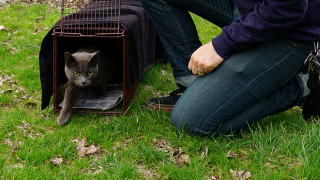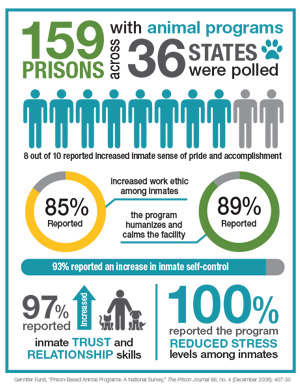Cats live in every imaginable environment. As long as they can eat and sleep in peace, you’ll find them in a variety of places, including correctional institutions, jails, and prisons. Though they aren’t serving time, community cats living on prison grounds are often locked in their own challenging situation. Many prisons consider trapping and moving them to shelters, where almost all would be killed.
That’s why Alley Cat Allies is proud to have stepped in to help two New Jersey prisons develop a humane, lifesaving approach to their community cat populationsTrap-Neuter-Return (TNR).
In 2015, we reinvigorated the TNR program at Bayside State Prison and started a new one at Southern State Correctional Facility. While some of the cats at Bayside State Prison had already been spayed or neutered and vaccinated through an existing TNR program, Alley Cat Allies smoothed out and expanded these services to reach even more cats. We have helped all the cats at both facilities118 cats at Bayside State Prison and 38 at Southern State Correctional Facility.
Trap-Neuter-Return is the most humane, effective way to help cats and people coexist, whether in a cul-de-sac or a prison yard. If not for our work with these prisons, their community cats would have been killed in shelters years ago .
Coming Together to Solve Unique Challenges
Every aspect of prison life is highly regimented and services for community cats are no exception. As we built our programs, we faced unique challenges in terms of security protocols. Having an open dialogue and coming together to create solutionsalways an important part of TNRwas the key to moving forward.
Like everyone who goes in and out of prisons, we had to obtain proper clearance to get our staff inside to trap. This included background checks, ID badges, screenings, and training in prison regulations. We also worked with prison administration to make sure only vetted supplies enter prison grounds. Following these security protocols helps keep everyone safe.
Since it’s not so simple for cats on prison grounds to go to veterinary appointments, Alley Cat Allies created the Bayside State Prison Cat Wellness Program to provide systematic, ongoing care for community cats. Every cat has a medical record, microchip, and annual veterinary appointment. From April to August 2017, 40 cats were taken to a veterinarian for a general annual wellness exam. Any cats who need additional veterinary attention have staff ready to take them.
Through all the screenings and protocols, we never lost sight of the true heart of these programs: The health and happiness of the cats and their bonds with their caregivers. Each cat has a namelike Bruiser, Shady, Daisy, and Tom Tomand corrections officers and inmates go to great lengths every day to care for them. An Alley Cat Allies staff member visits regularly, and we are always thrilled to see how the cats brighten the prison environment.
Prison Programs Help Cats and People
Caring for community cats has profound effects on both the health and happiness of cats, inmates, and administrators. TNR programs also have proven benefits for prison facilities and society. These are just some of them:
- Spaying and neutering stabilizes the cat population so no new kittens are born.
- Veterinary care, including vaccinations, keeps the cats healthy.
- The cats give inmates a humane education, encouraging compassion, instilling responsibility, and teaching accountability. Inmates develop strong and loving bonds with the cats while learning how to nurture them.
- Inmates who interact with the cats show reduced recidivism rates, meaning they have less of a chance of relapsing into criminal behavior, and have fewer infractions.
- Prison administration can use the program as an incentive for inmates’ good behavior.
- Having a formalized program ensures the cats are getting consistent care that follows prison rules and regulations.
- Corrections officers who care for the cats develop close bonds of their own.
Among the findings from the first national survey1 on prison-based animal programs, conducted in 2006, 159 prisons in 36 states reported the following:
- 100 percent reported reduced inmate stress levels
- 97 percent reported increased inmate relationship/trust skills
- 93 percent reported increased inmate self-control
- 89 percent said the program humanizes/calms the facility
- 85 percent reported increased inmate work ethic
- 80 percent reported increased inmate sense of pride/accomplishment
Our efforts at Bayside State Prison and Southern State Correctional Facility prove that TNR is the only humane and effective approach for community cats. They also illustrate how cats and people can improve each other’s lives. Both inmates and corrections officers have developed bonds with the cats, and all say they love having them around.
“This program works,” one corrections officer said. “Not only do we have a partner in Alley Cat Allies, we have a program that meets the needs of the cats, the facility, and the inmates.”
Alley Cat Allies is still hard at work helping cats and people in New Jersey prisons. We are proud to serve as a model for other prisons with community cat populations to follow.
1. Gennifer Furst, “Prison-Based Animal Programs: A National Survey,” The Prison Journal 86, no. 4 (December 2006): 407-30.


